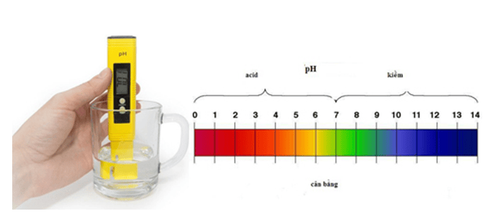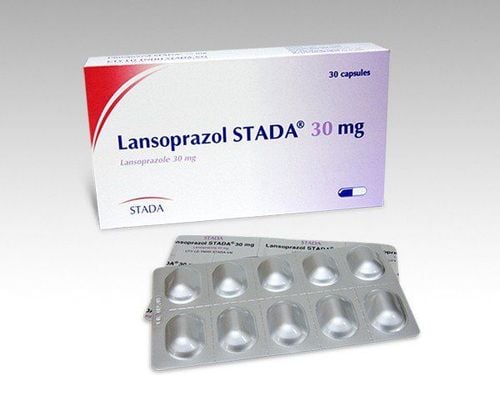This is an automatically translated article.
Posted by Master, Doctor Mai Vien Phuong - Department of Examination & Internal Medicine - Vinmec Central Park International General Hospital
Vomiting is a symptom of the gastrointestinal tract common in young children, especially infants. In adults, regurgitation is a symptom of gastroesophageal reflux. This article explores the common causes, diagnosis, and treatment of vomiting incontinence in both adults and infants.
1. What is vomiting and why does it happen?
Reflux occurs when a mixture of gastric juices, and sometimes undigested food, backs up into the esophagus and into the mouth.
In adults, involuntary regurgitation is a common symptom of acid reflux and GERD. It can also be a symptom of a rare condition called rumination disorder. In infants, regurgitation is normal during the first year of life.
2. What is Acid Reflux and GERD?
Acid reflux occurs when substances from the stomach move up the esophagus. It is also known as acid reflux or gastroesophageal reflux.
If you have symptoms of acid reflux more than twice a week, you may have a condition called gastroesophageal reflux disease (GERD). To learn more about GERD, refer to the article below.
MORE: Overview of reflux esophagitis

3. Causes of vomiting
The cause of vomiting can vary depending on whether it occurs in an infant or an adult.
3.1. Adult
Acid Reflux Acid reflux is a condition characterized by reflux, heartburn, and bad breath. Common triggers include:
Eating multiple meals Eating certain foods Lying down right after eating GERD When acid reflux happens several times per week, it's called gastroesophageal reflux disease (GERD).
Rumination Rumination is a rare condition that causes frequent regurgitation with undigested food. This regurgitation happens often right after eating.
Doctors don't fully know its cause. Risk factors include a mental health condition or going through a stressful experience.
Vomiting syndrome is very rare, so unless there is persistent vomiting, vomiting is more likely to be caused by acid reflux or GERD.
Other causes Other causes of vomiting in adults include:
Gastrointestinal obstruction Pregnancy Certain medications Smoking Eating disorders Obstruction in the esophagus due to scarring or cancer can cause vomiting frequently. Early pregnancy hormones can cause the esophageal sphincter to relax, leading to vomiting.
Some medications can also irritate the lining of the esophagus, which can cause bile reflux. Smoking can worsen conditions like acid reflux and lead to increased regurgitation and regurgitation.
Binge eating can also cause vomiting. Binge eating is an eating disorder characterized by binge eating and eating all food.
bulimia is a much more serious cause of voluntary regurgitation. It requires mental health treatment.
3.2. Children
Vomiting is common in newborns and infants. However, some babies frequently spit up.
When this regurgitation is not accompanied by other symptoms, it is called functional regurgitation in infants. This condition is characterized by regurgitation more than once per day during the first year of life.
GERD can also affect infants, although not as commonly as it affects adults. Due to the short length of the esophagus, infants with GERD are more likely to have reflux rather than just reflux.
SEE ALSO: Vomiting and how to handle vomiting in children

4. Symptoms of vomiting
Symptoms of regurgitation vary according to the underlying cause. Pay attention to specific symptoms when it comes to vomiting in babies.
4.1. Adult
Many of the symptoms that accompany vomiting are caused by conditions that cause vomiting, such as acid reflux and GERD.
Symptoms of acid reflux and GERD include:
sour or chest pain Bitter or sour taste in the back of the throat Difficulty swallowing Feeling a lump in the throat Reflux of stomach acid or undigested food If vomiting occurs frequently without other symptoms of acid reflux or GERD, it could be ruminant syndrome. Symptoms of rumination syndrome include:
Frequent vomiting right after eating Stomach bloating Bad breath Nausea Weight loss
4.2. Children
Due to the size of the esophagus in newborns and infants, regurgitation is common during the first years of life.
If your infant has functional regurgitation, you may notice the following symptoms:
Vomiting frequently, at least twice daily Vomiting for at least 3 weeks Occurs during the first year of life There are usually no other symptoms associated with this condition other than vomiting. However, if regurgitation is a symptom of GERD, it may be accompanied by:
Difficulty swallowing food and liquids, which can cause vomiting or choking Irritability, back arching or avoidance while eating Frequent coughing and pneumonia If you notice your newborn has other symptoms, it could be a sign of a more serious condition. Watch out for:
Blood or bile in reflux Feeding problems Excessive crying Difficulty breathing
5. Diagnosing vomiting
5.1. Adult
Acid reflux is generally a temporary condition that does not require a formal diagnosis. However, because GERD requires long-term dietary and lifestyle management, your doctor may want to perform some diagnostic tests.
These tests may include:
Gastrointestinal X-rays Upper Gastrointestinal Upper Esophageal Imaging These tests can help your doctor determine the extent of damage to the esophagus and complications. due to GERD.
To diagnose ruminant syndrome, your doctor will first rule out other conditions, such as GERD. Additional testing may be needed, including an EGD test and a gastric emptying test.
These tests look for any blockages or slowed transit times that could be causing frequent regurgitation.
Many studies have demonstrated that 24-hour impedance pH monitoring is also an effective way to diagnose ruminant syndrome.
5.2. Children
Infant spitting up is a common and normal side effect of breastfeeding during the first years of life.
It is difficult for doctors to test for functional regurgitation in infants. However, if no further symptoms are present, the diagnosis can be made if regurgitation occurs at least twice daily for 3 weeks during the first year of life.
The same functional tests that doctors use to diagnose GERD in adults can also be used in infants. Includes:
Upper GI endoscopy and biopsy Esophageal pH measurement As you can imagine, these tests can be invasive for infants. They are usually used only in moderate to severe cases of infant GERD.

6. Treatment of vomiting
6.1. Adult
Medications are a common first-line treatment option for people with acid reflux and GERD. There are several medications that can treat these conditions, including:
Antacids, which can relieve mild GERD symptoms H2 blockers, which can decrease stomach acid production PPI antacids have May decrease stomach acid production in the long term. Sometimes, your doctor may prescribe stimulants and antibiotics to increase gastric emptying and reduce the risk of vomiting. There are currently no medications used to treat rumination syndrome. Instead, treatment relies on lifestyle changes.
6.2. Children
There are currently no drugs or surgery used to treat regurgitation in infants.
However, if your infant vomits due to GERD, your pediatrician may recommend the same GERD medications used for adults.
American Society of Asthma and Immunology recommendations recommend making the following lifestyle changes to reduce GERD symptoms:
Aim for a healthy weight. Quit smoking. Limit caffeine and alcohol intake. During meals, eat several small meals, chew thoroughly, and do not lie down after eating for at least 2 to 3 hours. When lying down at night, add a pillow for your head and neck. Treatment options for rumination syndrome focus on changing the behaviors that cause regurgitation, including:
Helping the diaphragm relax after eating Standing upright during and after meals Reducing stress during the hour In some cases, psychotherapy may be needed.
For infants who frequently spit up, doctors recommend that certain changes in the feeding process can help reduce vomiting:
Feed your baby in a quiet, undisturbed place to relieve stress and fussiness during feeding. Thicken formula or milk with 1 tablespoon of cereal per fluid ounce to aid digestion. Do not overfeed your infant. Overfeeding can cause vomiting. The same lifestyle recommendations for GERD in adults can be applied to infants, such as breastfeeding less often, and raising the head after meals.
7. When to see a doctor
If you or your infant is vomiting causing difficulty with holding food or accompanied by other symptoms, it's time to see your doctor.
Your doctor can help narrow down the cause of your frequent vomiting using your medical history and diagnostic testing.
Once the cause is identified, you and your doctor can work together to find medication and lifestyle changes to help reduce vomiting.
If your vomiting is a symptom of an eating disorder such as bulimia, there are resources that can help.
As a key area of Vinmec Health system, Pediatrics Department always brings satisfaction to customers and is highly appreciated by industry experts with:
Gathering a team of top doctors and nurses in Pediatrics : consists of leading experts with high professional qualifications (professors, associate professors, doctorates, masters), experienced, worked at major hospitals such as Bach Mai, 108.. Doctors All doctors are well-trained, professional, conscientious, knowledgeable about young psychology. In addition to domestic pediatric specialists, the Department of Pediatrics also has the participation of foreign experts (Japan, Singapore, Australia, USA) who are always pioneers in applying the latest and most effective treatment regimens. . Comprehensive services: In the field of Pediatrics, Vinmec provides a series of continuous medical examination and treatment services from Newborn to Pediatric and Vaccine,... according to international standards to help parents take care of their baby's health from birth to childhood. from birth to adulthood Specialized techniques: Vinmec has successfully deployed many specialized techniques to make the treatment of difficult diseases in Pediatrics more effective: neurosurgery - skull surgery, stem cell transplantation. blood in cancer treatment. Professional care: In addition to understanding children's psychology, Vinmec also pays special attention to the children's play space, helping them to have fun and get used to the hospital's environment, cooperate in treatment, improve the efficiency of medical treatment. Conclusion
Reflux occurs when digestive juices and undigested food back up from the esophagus into the mouth.
In adults, involuntary regurgitation is a symptom of conditions such as acid reflux, GERD, and ruminant syndrome. In infants, frequent regurgitation is a common symptom of functional infantile regurgitation and GERD.
There are many types of tests that your doctor will use to diagnose the cause of your frequent vomiting. Medications and lifestyle changes are the first line of defense in reducing vomiting and improving your quality of life.
Please dial HOTLINE for more information or register for an appointment HERE. Download MyVinmec app to make appointments faster and to manage your bookings easily.














